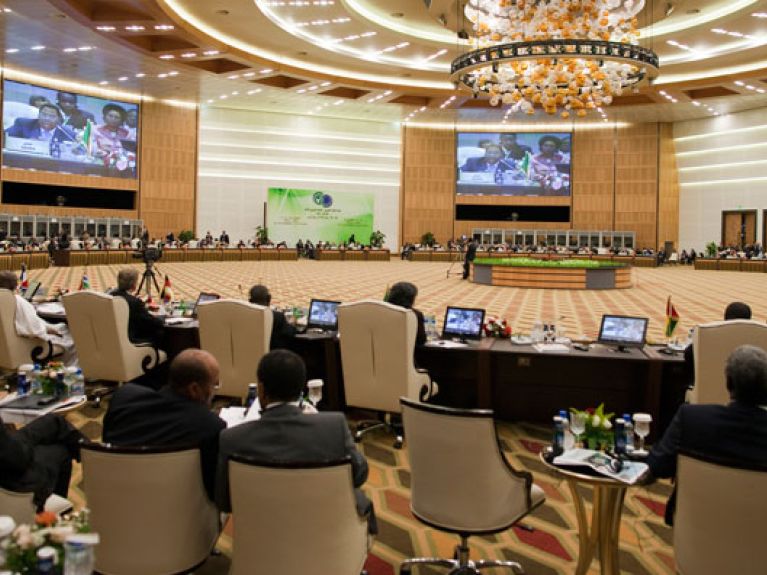Strategic partnership
The EU and Africa joined in a strategic partnership in 2007. A review of relations.

Common challenges and interests, such as combating climate change, reducing poverty or resolving conflicts, call for a strategic partnership between Europe and Africa. Since Europeans and Africans founded a strategic partnership in December 2007 in Lisbon, progress has been made on cooperation in numerous policy areas. However, the Joint Africa-EU Strategy has only been able to partially contribute to strengthening political relations and to developing more coherent cooperation between the continents.
The objectives that the European Union and the African Union set themselves in Lisbon are more relevant than ever today. The joint strategy aims to strengthen the relations between the two continents in order to cooperate more closely as equals in areas going beyond development cooperation and African affairs. Europeans and Africans want to improve their cooperation both bilaterally and in international bodies, especially in their efforts to strengthen peace and security, democratic governance and human rights, to combat climate change and to improve energy security. The aim is to underpin these efforts by intensifying political dialogue between the European Union (EU), the African Union (AU) and its member states in eight thematic partnerships and to also very consciously involve nongovernmental organizations, civil society and private enterprise. Europe and Africa agreed the joint strategy to create an adequate response to geostrategic changes and to political developments in Europe and Africa. Against the background of increased economic and political relations between China, India and other emerging powers and African countries, the strategic partnership was established to give the African-European relationship new meaning. The establishment of the joint strategy also reflects the increasing political integration on both continents: the founding of the African Union in 2002, its commitment to values that are also upheld in the EU and the signing of the 2007 Lisbon Declaration generated a new dynamic that facilitates political cooperation.
Europeans and Africans have made progress particularly in implementing the thematic partnerships. The joint progress report at the 2010 summit in Libya showed that progress had been made especially by those partnerships that were able to build on cooperation structures and initiatives that already existed before the joint strategy was developed. These included, for instance, cooperation in the area of peace and security, energy and the partnership for infrastructure. In other cooperation areas, especially democratic governance and human rights, implementation is still in the early stages. The EU is planning to make one billion euros available between 2014 and 2020 for a new pan-African instrument that could also be used to support the thematic partnerships. This instrument not only means more money for the partnerships, it also enables more centralized funding. Up until now the partnerships were financed from a great variety of sources, for instance from funds for the EU Neighbourhood Policy.
Above and beyond the concrete action plans, however, the joint strategy has so far only made a limited contribution to achieving wider goals. Political dialogue is progressing relatively well in some partnerships, such as in the field of peace and security or on the subject of energy. Up to now, however, the strategy has hardly led to closer cooperation between Europeans and Africans or to better agreement in international bodies when it comes to other areas such as climate change or democratic governance. Although Europeans and Africans managed to negotiate a common position before the Copenhagen climate change summit of 2009, they went different ways during the conference itself. European and African states are increasingly voting differently on human rights issues in UN bodies.
This was the background against which enthusiasm for the strategy had already waned on both sides before the EU-Africa summit in Tripoli. Differences of opinion in a variety of politically sensitive areas – such as migration or the unsolved question of Economic Partnership Agreements (EPA) – are a constant burden on relationships. In addition to this, NATO’s military intervention in Libya in 2011 led to disputes.
So far, the institutions and dialogue structures that were created with the strategy are hardly being used to seek solutions to controversial topics. Instead, Europeans and Africans are concentrating on implementing the action plans and to a large extent on more technical questions. But on its own, the implementation of projects and programmes within the framework of the eight partnerships will not necessarily lead to cooperation between European and African countries “on equal terms” and to closer political relationships that go beyond development cooperation. In addition to that, this is the way the Federal Foreign Office sees it, the strategy is sometimes regarded as an additional source of resource transfer by the African side, while the EU and its member states primarily consider it a platform for dialogue.
European-African relations are not lacking in relevance and themes. Although Africans have gained new attractive partners in the shape of China and other emerging powers, they still share very many common interests with the EU. However, as long as there is little political will at the highest political levels on both sides to strengthen the partnership and hardly any concrete steps are agreed to implement the defined goals, the joint strategy will remain a paper tiger without teeth. Both sides should therefore use the time until the next EU-Africa summit in Brussels in 2013 to develop the instruments of their partnership.
The authors are researchers in the Bi- and Multilateral Development Cooperation Department of the German Development Institute (DIE) in Bonn.
